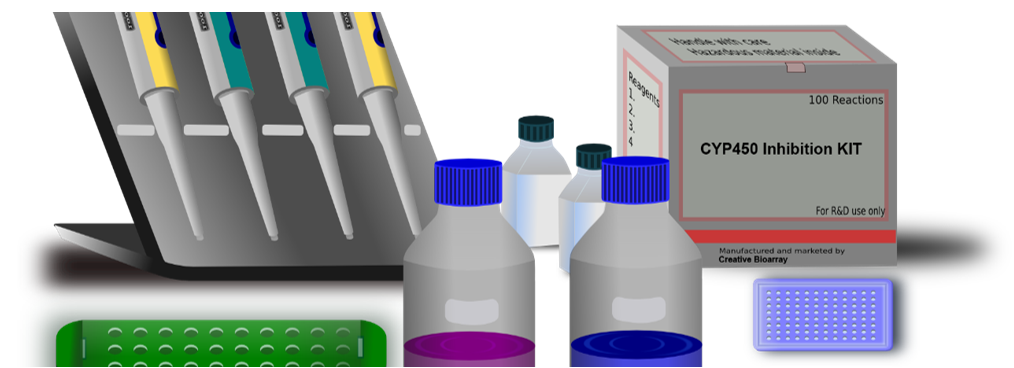In Vitro Metabolism Assay Kits & Reagents

The liver is the most important site of drug metabolism. Here the processes of drug inactivation and acquisition of pharmacological activity by the prodrug take place.
Many drugs are metabolized in two phases.
- Non-synthetic reactions such as the production of new or modified functional groups or cleavage are included in Phase I reactions (oxidation, reduction, hydrolysis).
- Phase II reactions involve synthetic reactions, such as binding to endogenous substances (e.g., glucuronides).
Metabolites formed in synthetic reactions are more polar and therefore more readily excreted by the kidney (urine) and liver (bile) than those formed in non-synthetic reactions. Some drugs undergo only phase I or phase II reactions.
CYP450
In phase I metabolism, the most important enzyme system is cytochrome P-450 (CYP450), a microsomal superfamily of isoenzymes that catalyze the oxidation of many drugs. Electrons are provided by NADPH-CYP450 reductase, a flavoprotein that transfers electrons from NADPH to CYP450.
CYP450 enzymes can be induced or inhibited by many drugs and substances, leading to drug interactions in which one drug enhances the toxicity or reduces the therapeutic effect of another drug.
Glucuronidation
Glucuronidation is the most prevalent phase II reaction and is the only one occurring in the hepatic microsomal enzyme system. Glucuronidation is secreted in the bile and excreted in the urine. Thus, conjugation renders most drugs more soluble and easily excreted by the kidneys. The conjugate produced by binding amino acids to glutamine or glycine is readily excreted in the urine but is not secreted in significant amounts into the bile.
Creative Bioarray provides professional in vitro metabolism assay services and efficient kits, which allows our clients to perform in vitro metabolism testing on their own terms.
In Vitro Metabolism Assay Kits
In Vitro Metabolism Assay Matrix
In Vitro Metabolism Assay Reagents
Related Services
Description: Metabolite of the probe substrate for CYP1A2.
Description: Metabolite of the probe substrate for CYP2A6.
Description: Metabolite of the probe substrate for CYP2C9.
Description: Metabolite of the probe substrate for CYP2C19.
Description: Metabolite of the probe substrate for CYP2C19.
Description: Metabolite of the probe substrate for CYP2D6.
Description: Metabolite of the probe substrate for CYP2E1.
Description: Metabolite of the probe substrate for CYP3A4.
Description: Metabolite of the probe substrate for CYP3A4.
Description: Metabolite of the probe substrate for CYP2B6.
Description: Metabolite of the probe substrate for CYP2C8.